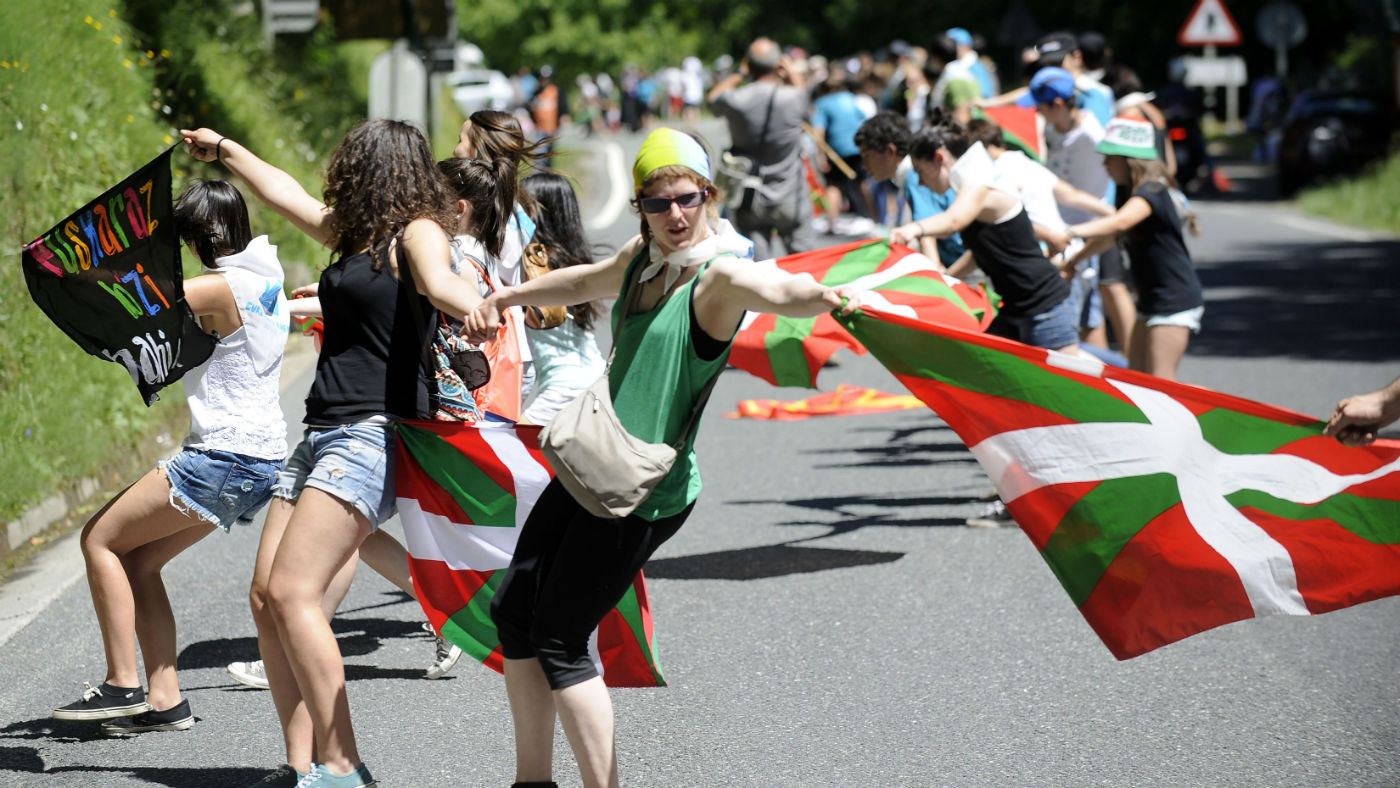Spain’s Basques form 125-mile human chain calling for independence vote
Tens of thousands of people hold hands to demand referendum

A free daily email with the biggest news stories of the day – and the best features from TheWeek.com
You are now subscribed
Your newsletter sign-up was successful
Tens of thousands of people from Spain’s Basque region have joined hands to form a human chain extending 125 miles in order to call for an independence referendum.
The protest, organised by Basque separatist group Gure Esku Dago (In Our Own Hands), stretched from Donostia (known in Spanish as San Sebastian) to the Basque parliament in Gasteiz.
Reuters says that “while most from the Basque Country, which already has a high level of self-determination and, like Catalonia, has its own language and culture, do not support independence, many believe the population should be given the right to vote”.
The Week
Escape your echo chamber. Get the facts behind the news, plus analysis from multiple perspectives.

Sign up for The Week's Free Newsletters
From our morning news briefing to a weekly Good News Newsletter, get the best of The Week delivered directly to your inbox.
From our morning news briefing to a weekly Good News Newsletter, get the best of The Week delivered directly to your inbox.
Earlier this year the Basque nationalist terror group ETA announced it was formally disbanding.
Calls for a vote on Basque nationality will provide a early test for Spain’s new prime minister, Pedro Sanchez, who ousted his predecessor Mariano Rajoy in a vote of no confidence which he narrowly won thanks to support from Basque and Catalan nationalists.
Rajoy was roundly criticised for his heavy-handed approach to last year’s Catalan independence referendum which saw police clash with protesters.
The ballot on Catalonia's separation from Spain and consequent unilateral declaration of independence by the regional government prompted Madrid to take control of the region and arrest the civil servants involved in the vote.
A free daily email with the biggest news stories of the day – and the best features from TheWeek.com
Sanchez will be looking to avoid a similar showdown in the Basque region which already enjoys relative autonomy. However, he is expected to take a similar line to his predecessor and maintain that any ballot on regional independence is illegal under the Spanish constitution.
-
 House votes to end Trump’s Canada tariffs
House votes to end Trump’s Canada tariffsSpeed Read Six Republicans joined with Democrats to repeal the president’s tariffs
-
 Bondi, Democrats clash over Epstein in hearing
Bondi, Democrats clash over Epstein in hearingSpeed Read Attorney General Pam Bondi ignored survivors of convicted sex offender Jeffrey Epstein and demanded that Democrats apologize to Trump
-
 Are Big Tech firms the new tobacco companies?
Are Big Tech firms the new tobacco companies?Today’s Big Question Trial will determine if Meta, YouTube designed addictive products
-
 Epstein files topple law CEO, roil UK government
Epstein files topple law CEO, roil UK governmentSpeed Read Peter Mandelson, Britain’s former ambassador to the US, is caught up in the scandal
-
 Iran and US prepare to meet after skirmishes
Iran and US prepare to meet after skirmishesSpeed Read The incident comes amid heightened tensions in the Middle East
-
 Israel retrieves final hostage’s body from Gaza
Israel retrieves final hostage’s body from GazaSpeed Read The 24-year-old police officer was killed during the initial Hamas attack
-
 China’s Xi targets top general in growing purge
China’s Xi targets top general in growing purgeSpeed Read Zhang Youxia is being investigated over ‘grave violations’ of the law
-
 Panama and Canada are negotiating over a crucial copper mine
Panama and Canada are negotiating over a crucial copper mineIn the Spotlight Panama is set to make a final decision on the mine this summer
-
 Why Greenland’s natural resources are nearly impossible to mine
Why Greenland’s natural resources are nearly impossible to mineThe Explainer The country’s natural landscape makes the task extremely difficult
-
 Iran cuts internet as protests escalate
Iran cuts internet as protests escalateSpeed Reada Government buildings across the country have been set on fire
-
 US nabs ‘shadow’ tanker claimed by Russia
US nabs ‘shadow’ tanker claimed by RussiaSpeed Read The ship was one of two vessels seized by the US military